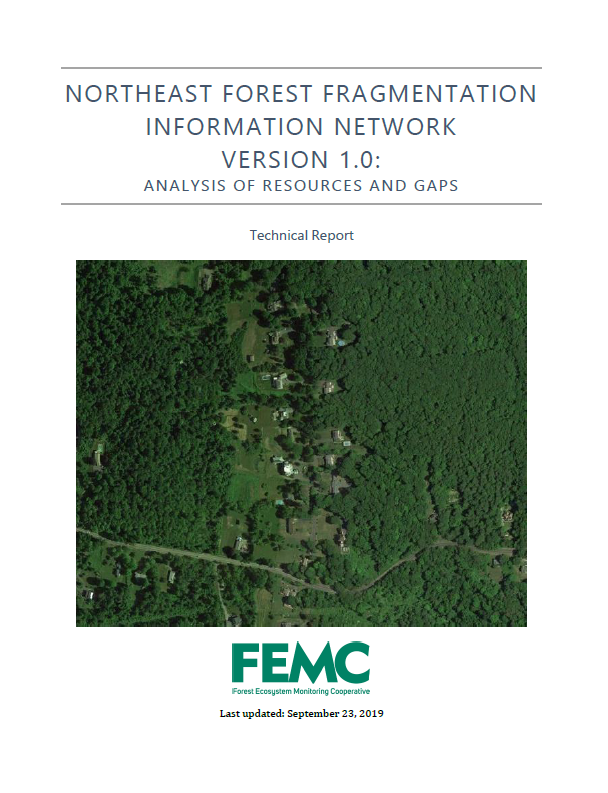FragNet
The Northeast Forest Fragmentation Information NetworkAbout FragNet
The Northeast Forest Fragmentation Information Network (FragNet) is an information clearinghouse containing a wealth of various resources to understand and address forest fragmentation. The goal of FragNet is to make it easier for researchers, land managers, policy makers, academics, and local governments to find and access all the available information on fragmentation occurring within their area of interest in a streamlined manner.
Using FragNet, you can explore resources from maps to scientific articles. FragNet provides a summary of each resource highlighting important information reducing review time. In the summaries you'll find information such as
- A brief summary of the resource
- Key personnel and/or the lead institutions involved
- The location(s) covered by the resource
- A citation (as provided by the resource or created by FEMC)
- A link to the original resource and a download link
As an information clearinghouse, FragNet collects a variety of information on topics related to forest fragmentation including fragmentation mitigation, adaptation, and land use change. It also includes information about wildlife mortality on roads, forest communities, and the state's transportation agencies efforts to reconnect habitat blocks. FragNet offers an assortment of resource types such as reports, articles, maps and images, pamphlet and posters, datasets, books, and policy documents.
FragNet is envisioned as a resource for advocates, researchers, natural resource management staff, non-profits, students, educators, and the general public.
Analysis of Resources and Information Gaps

Utilizing the content in FragNet, FEMC staff conducted an analysis of the resources available in our region and gaps in topics and content types. Click the report image or here to see the full report.
This report is an example of how the FragNet information clearinghouse tool can be used to identify areas where research is needed.
Keeping FragNet Updated
In the initial pilot phase of FragNet, we focused on resources pertaining to the state of Vermont. With the initial framework built our goal was to open FragNet up to the larger north eastern region to include states such as Maine, Massachusetts, New Hampshire and New York. In the fall of 2018 we released the second version of Fragnet with an additional 200 resources from the states mentioned above. FragNet is now a truly regional platform for finding resources to further understand forest fragmentation, and regular searches for new content are conducted every 6-12 months to keep FragNet up to date and relevant.
If you believe we have overlooked a resource that should be included in FragNet, let us know! In an effort to keep FragNet up-to-date and relevant we try our best to upload the latest resources, but with the speed and volume that information is released we will need all the help we can get. If you think something is missing please recommend it to us using out contribution form and we’ll get it into the system as quick as possible. Thank you for contribution to FragNet!
The Creators of Fragnet
The Northeast Forest Fragmentation Information Network was created by the Forest Ecosystem Monitoring Cooperative in collaboration with the Department of Forests, Parks and Recreation in the Vermont Agency of Natural Resources. The mission of the Forest Ecosystem Monitoring Cooperative is to serve the northeast temperate forest region through improved understanding of long-term trends, annual conditions, and interdisciplinary relationships of the physical, chemical, and biological components of forested ecosystems.
The FEMC also promotes the efficient coordination of multi-disciplinary environmental monitoring and research activities among federal, state, university, and private-sector agencies with common interests in the long-term health, management, and protection of forested ecosystems.
FEMC works towards its mission and goals with a professional staff, web-based Project Library and Database, education and outreach programs, and continuing efforts to support and coordinate the region’s forest ecosystem interests.
To learn more about FEMC visit uvm.edu/FEMCThis work was made possible by long-term funding from the U.S. Department of Agriculture, Forest Service, Northeastern Area - State & Private Forestry.
Contact Us
Email: femc@uvm.edu
On the Web: www.uvm.edu/femc
